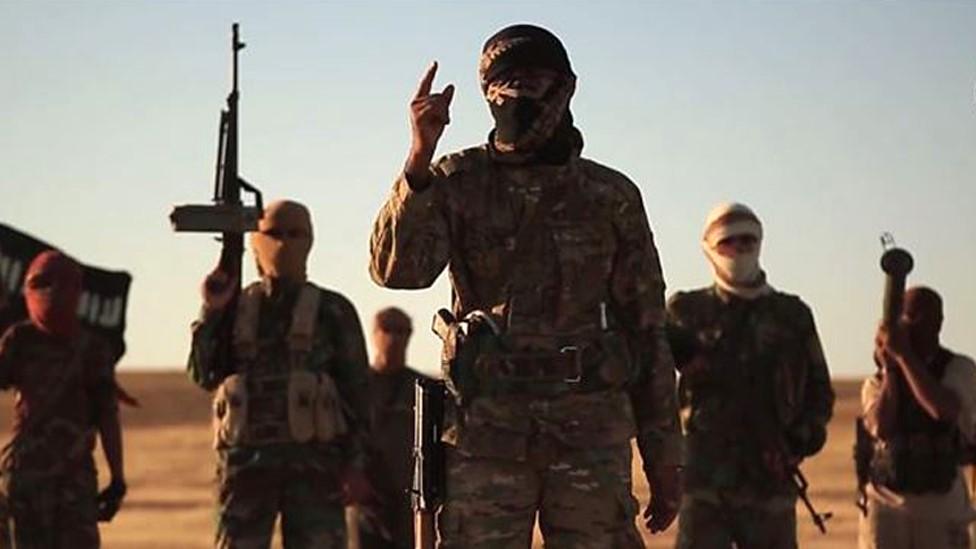Why Soleimani's death is personal for Pompeo
- Published
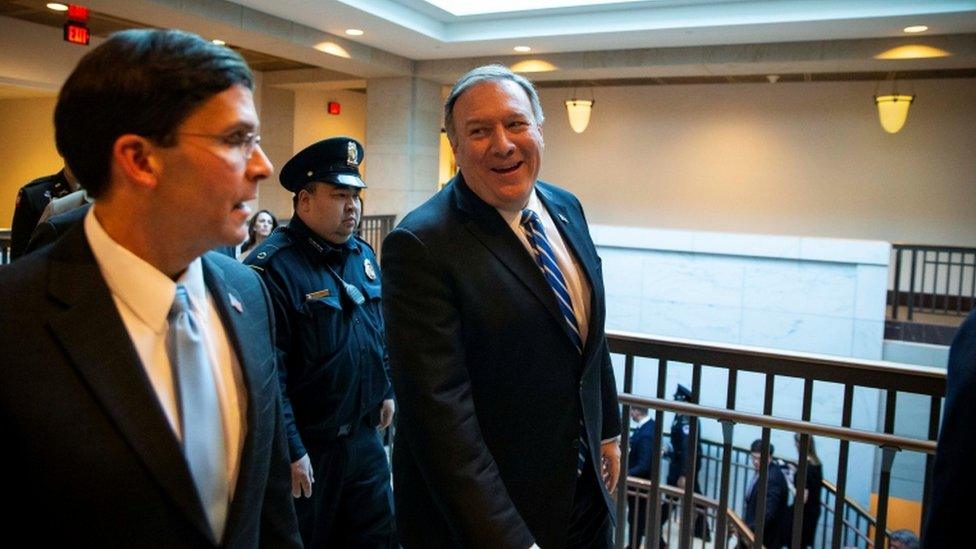
Pompeo chats with the US defence chief after Wednesday's classified Iran briefing to lawmakers
Few American officials have been as laser focused on Iran as Secretary of State Mike Pompeo, writes the BBC's Suzanne Kianpour. For him, the conflict is personal.
In early 2016, the first-term Kansas congressman personally dropped off his application for an Iranian travel visa, which he had addressed to Supreme Leader Ayatollah Khamenei.
He and two other House Republicans had rolled up in black cars to the Pakistani embassy in Washington - home to the Islamic Republic of Iran's diplomatic interests section in the absence of official relations with the US.
The congressmen's goals were ambitious.
They wished to go to Tehran to monitor Iran's parliamentary election, visit nuclear sites, hold meetings with top Iranian officials, meet American prisoners, get a briefing on the country's ballistic missile programme and more.
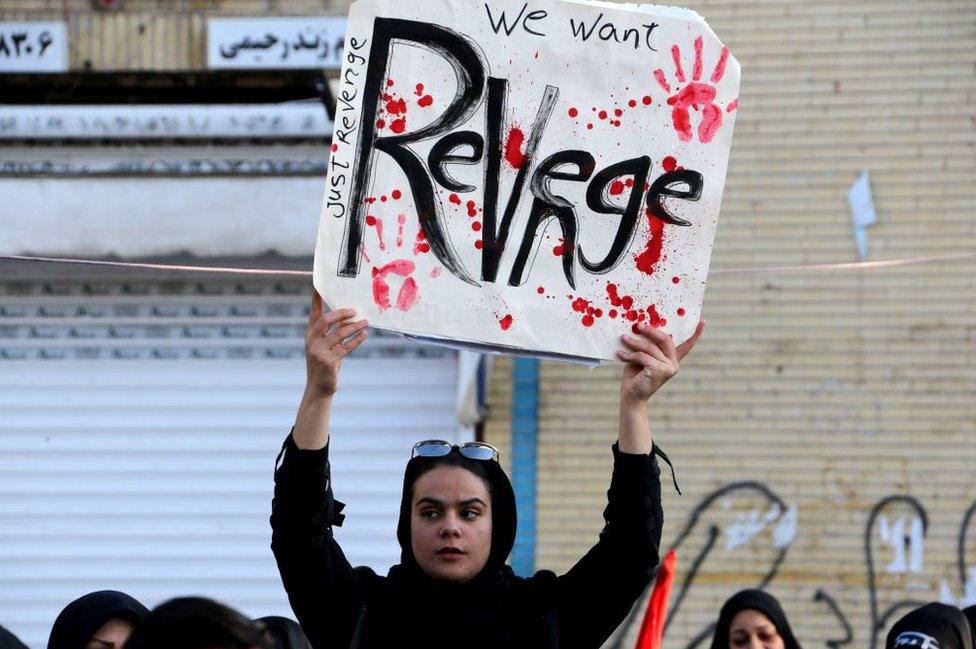
Naturally, the men didn't make it past the lobby let alone into Iran, but Pompeo had sent a clear message - I've got my eye on you.
A year later, the now-junior congressman had played his political cards right and quickly risen up the ranks, securing himself a plum job in the Trump administration as America's spy chief.
An Iranian official joked that in hindsight they wished the embassy had issued him a travel visa. "We could have had the CIA director in Tehran!"

During his six years as a congressman, Pompeo had one defining pet project - getting to the bottom of the 2012 insurgent raid on the US compound in Benghazi, Libya, which killed American ambassador Christopher Stevens.
He was among the Republicans leading the charge in castigating then Democratic presidential candidate and former US Secretary of State Hillary Clinton, whom he blamed for not doing more to rescue the doomed ambassador and three other American officials who were also killed.
But he also had his eye on Iran's Islamic Revolution Guard Corp (IRGC).
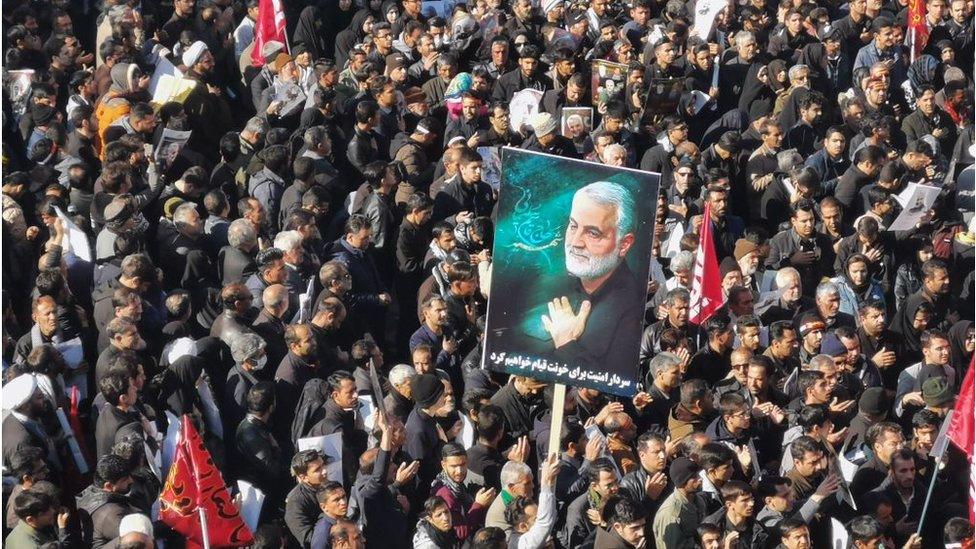
Funeral services were held across Iran for the assassinated top general
As a member of House Permanent Select Committee on Intelligence, Pompeo regularly called upon US intelligence agents to discuss the Quds Force and Qasem Soleimani.
He's been focused on Soleimani personally for years.
So when the opportunity to scalp Soleimani presented itself, Pompeo was among those who advised Trump to take it, despite knowing it could lead to war and the activation of Iranian terror cells around the world.
Concern about Iran's proxy militias had prevented previous American presidents Barack Obama and George W Bush from killing Soleimani.

The decision to target the Iranian general was two-fold for Pompeo.
Preventing another Benghazi raid after the US embassy in Baghdad was breached in late December loomed large. But revenge against the IRGC dates back to his time at the US military academy at West Point.
During the time Pompeo was a cadet from 1982 to 1986, tensions with Iran and its proxy Hezbollah in Lebanon were high.
The Cold War was still going on and Pompeo was sent to Germany to serve as a US Army officer.
In that time, 241 US Marines and sailors died in an attack on a barracks for US peacekeepers in Beirut, where kidnappings were also running rampant.
The Soviet threat was existential, but for a young Pompeo, the most immediate emerging threat was Iran and its proxies.

Fast forward 35 years later, the US has delivered the most significant blow to that threat to date.
"It's big for Pompeo because he convinced the president how important Qasem Soleimani is," says Michael Pregent, a former US Army intelligence officer who served in Iraq and recently testified to Congress about the level of influence Soleimani had in Iraq.
"Taking out the Iranian navy [or] a nuclear site; none of that equalled to Qasem Soleimani."
"That's the biggest guy you can take out short of the Ayatollah," says Pregent, who has briefed Secretary Pompeo multiple times on the Quds Force.
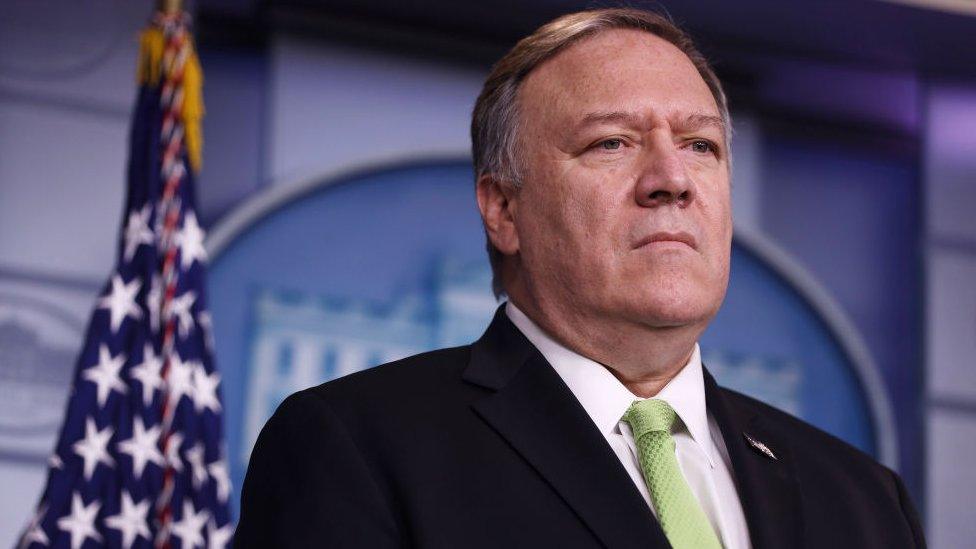
Taking out Soleimani gives Baghdad an opportunity to pull away from Iranian influence, potentially handing the secretary of state a diplomatic victory as well as a military one.
But Pompeo is so much more than secretary of state, says one former top aide.
Steve Bannon, the mastermind behind Trump's victory in the 2016 presidential election and former White House advisor, says he also plays the role of de facto defence secretary, National Security Advisor and also head of the CIA.
President Trump does not have the same rapport with the officials in those roles as he does with his secretary of state.
The close relationship Pompeo has with Trump was teed up by Bannon, who says Pompeo was chosen as CIA director soon after election day in 2016 because of his well thought-out ideas on national security - especially regarding Iran.
In Trump's first weekend as president, both Bannon and Pompeo held a private chat as they watched Trump deliver a speech at the CIA's Virginia headquarters while a battle raged in the ancient city of Palmyra, Syria.
US special forces were supporting fighters trying to win back the ancient city from ISIS at the time. The Quds Force was also present in Palmyra, which 3,000 years ago had served as a way station between the Romans and Parthian Empire (which was Iranian).
Later, the Roman and Persian empires went to war.
"It hasn't changed. We're the Romans," joked Bannon. It was in this conversation that Bannon asked Pompeo to personally deliver the ultra-classified daily presidential intelligence briefing.
"He needs someone he can relate to," Bannon told the future top US diplomat.

Bannon says that Pompeo's evangelical Christian faith also plays a role in his views on Iran. He's a supporter of Israel - a rival of Iran.
In private, Iranian officials seem to have a fixation on Pompeo and an acknowledgment that - of the Trump administration knives that were out for the regime - his were among the sharpest.
Pompeo recently flirted with running for Senate, but decided against it and is instead remaining secretary of state during a time of heightened global tensions that many fear could still lead to war.
People briefed on the matter expect to see the White House doubling down on sanctions and sanctions enforcement.
The ultimate goal is to bring Iran back to the negotiating table.
"There needs to be an effective and comprehensive JCPOA [nuclear deal] 2.0 that covers Iran's regional activities, proxies, missile programs and includes a regional voice at the table this time," says United Arab Emirates ambassador to the US, Yousef al Otaiba.
There is little doubt that Pompeo will some day run for president. But until then, he will continue to be a thorn in Iran's side as the administration's maximum pressure campaign to bring the regime to its knees continues.
- Published26 April 2018

- Published26 October 2019
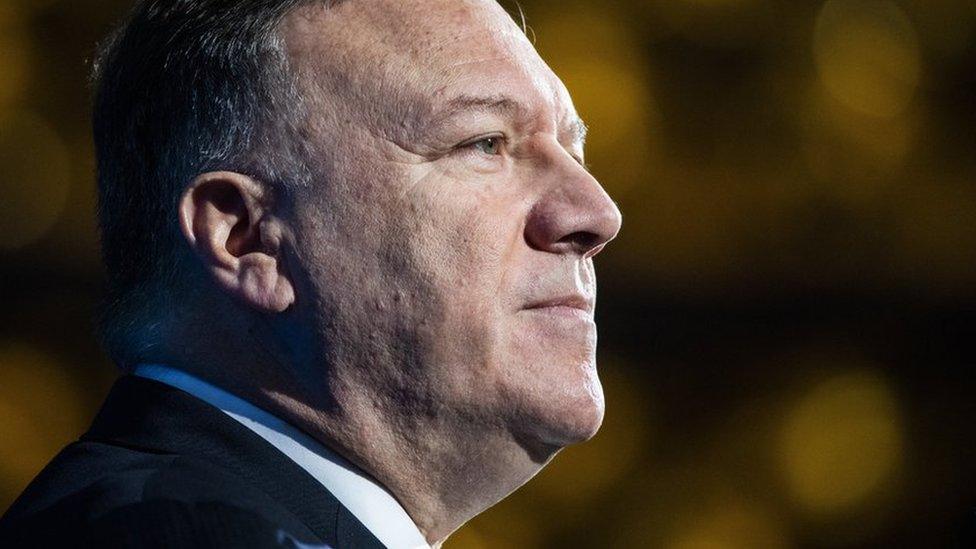
- Published22 March 2019
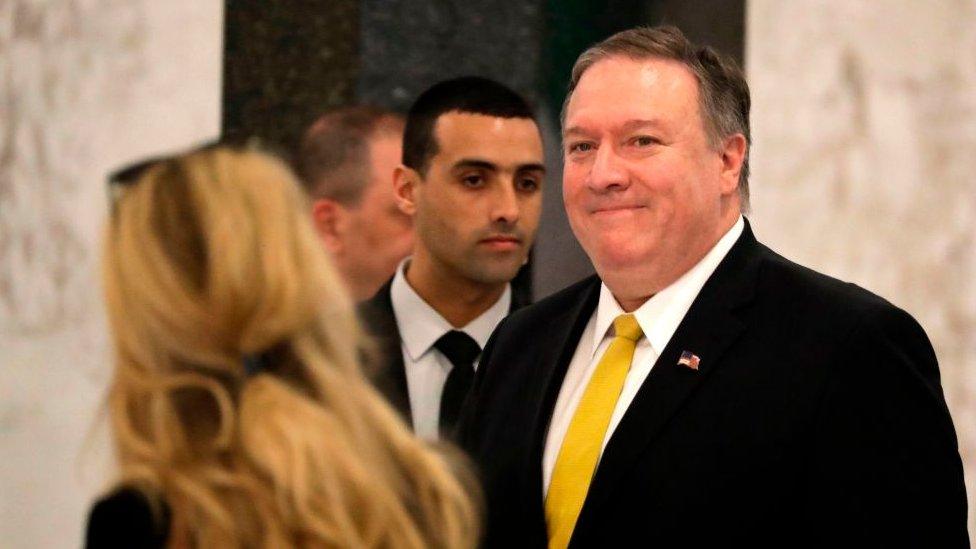
- Published10 January 2020
